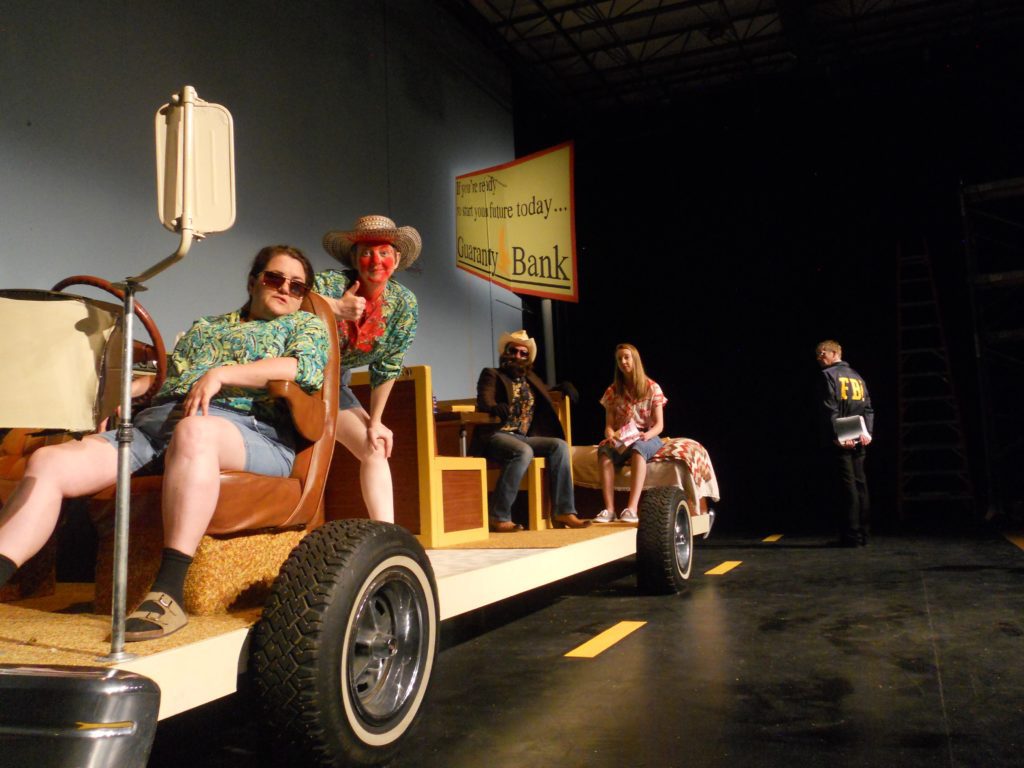It’s OK if you detect a trace of Walter White and a touch of “American Hustle ” in “Peggy Jo and the Desolate Nothing,” onstage at Bunport though June 21.
After all the tale of Peggy Jo Tallas, who in the early 1990s was one of Texas’ more vexing bankrobbers, is surely one of reinvention and of a quasi-accidental life of crime embraced.
“Most of what follows is true,” cautions one of the four actors playing the title character. Three are women: Hannah Duggan, Erin Rollman and Emily Harrison. Brian Colonna completes the quartet, wearing a bushy beard seemingly borrowed from Yukon Jack or, closer to home, Colorado Rockie Charlie Blackmon.
His character is credited as “Peggy Jo Tallas as Cowboy Bob.” Erik Edborg plays FBI agent Steve Powell, who tries to get Peggy Jo to open up after she is first apprehended.
In 2005, Texas Monthly published “The Last Ride of Cowboy Bob,” by Skip Hollandsworth. The play’s go-to source, it begins benignly enough: “Peggy Jo Tallas was, by all accounts, the classic good-hearted Texas woman. For much of her adult life, she lived with her ailing mother in a small apartment in the Dallas suburbs.”
The rub? Peggy would don male attire, glue on facial hair, pull a cowboy hat down over her wig, walk into banks in towns like Irving, Garland, and fatefully, Tyler, hand the teller a note and walk out with cash.
When she was arrested in 1992, family and friends were gobsmacked by her exploits, according to the article. And Agent Powell, who’d been bedeviled by a robber he dubbed Cowboy Bob, was just as astonished to learn the true identity of his quarry.
Of course, true identities are a complicated notion. What truths does the story of a tight-lipped, cross-dressing (for the purposes of heists) bank robber actually reveal? That is the quandary at the heart of “Peggy Jo and the Desolate Nothing.”
How do yarns get spun? How do they figure in and entwine with popular and the broader culture? For instance, a friend of Peggy Jo said Peggy’s favorite movie was 1969’s outlaw gem “Butch Cassidy and the Sundance Kid,” starring – all the Peggys seem to agree – “two of the prettiest men” ever. The iconic scene of Paul Newman riding a bike with Katharine Ross set to “Raindrops Keep Fallin’ on My Head,” becomes fodder for debates about the merits of B.J. Thomas’ No. 1 hit.
Still there’s more here than easy winks. According to other not-quite-reliable sources, Peggy was fond of cooking up “fajita meat.” Who calls it “fajita meat” for goodness sake? Yet that phrase becomes a staple of the legend. So does her drinking Pepsi out of a coffee mug.
When we can’t (or don’t want to) get at the roots of a tall tale, little details are treated as huge clues. The idea that Peggy started robbing banks to pay for her mother’s medication is touched on but never exploited. Remember, it didn’t take long into “Breaking Bad” to sense Walter’s cancer was not the only reason he plunged deeper and deeper into the meth biz.
Smart, poignant, this adventure in story-telling – and story-withholding – is the work of Buntport and Boulder’s Square Product Theatre. This is their first collaboration, though neither is stranger to putting its big brain together with another troupe and seeing what happens.
What happens here is at once funny and sad and thought-provoking – often simultaneously. The four Buntport performers – Edborg, Duggan, Rollman and Colonna – bring their typically deft comedic timing to the show. Square Product’s Harrison injects a tempering vulnerability.
The scenic design – chiefly the chassis of a RV – sets the tone for themes about escape and home and, yes, America.
The script is careful to hew to the facts – details – as learned mostly through Hollandsworth’s article. I can imagine some might have wished for more artistic license.
Instead “Peggy Jo and the Desolate Nothing” feels respectful – of Peggy Jo’s silences, yes, but also the audience’s ability to consider deeper questions while knowing some answers are never fully forthcoming.
As Agent Powell says “There’s more than one way to choke a dog with pudding.” Right. Uh, we think.
-Lisa Kennedy, June 7, 2014, Denver Post
